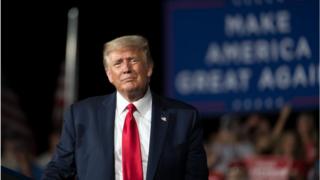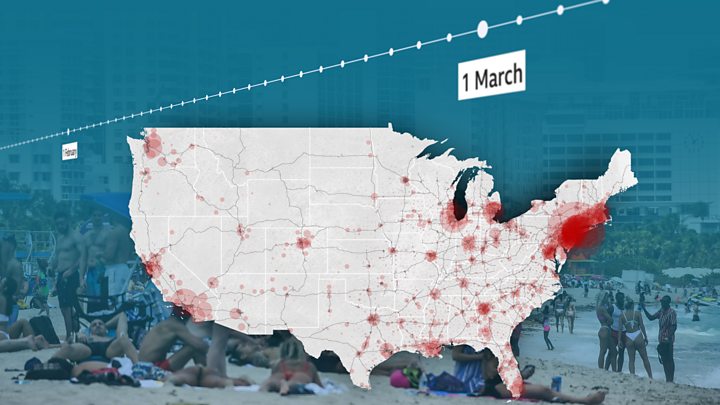 Image copyright
Getty Images
Image copyright
Getty Images
President Donald Trump knew Covid-19 was deadlier than the flu before it hit the US but wanted to play down the crisis, according to a new book.
Bob Woodward, the journalist who broke the Watergate scandal, interviewed Mr Trump 18 times from December to July.
Mr Trump told him the virus was "deadly stuff" before the first US death was confirmed, later adding he wanted to "play it down" to avoid causing panic.
The president has previously called the book a "fake".
Mr Trump tweeted in August: "The Bob Woodward book will be a FAKE, as always, just as many of the others have been."
He also called the storied reporter a "social pretender", "who never has anything good to say".
On Wednesday, some US media released parts of the interviews between the president and the journalist, revealing his reported remarks on the pandemic as well as race and other issues.
Here are some of the key quotes so far from Rage, which will be released on 15 September.
On the virus
In interviews with Woodward, Mr Trump indicated that he knew more about the severity of the illness than he had said publicly.
According to a tape of the call, Mr Trump told Woodward in February that the coronavirus was deadlier than the flu.

Media playback is unsupported on your device
"It goes through the air," Mr Trump told Woodward on 7 February.
"That's always tougher than the touch. You don't have to touch things. Right? But the air, you just breathe the air and that's how it's passed.
"And so that's a very tricky one. That's a very delicate one. It's also more deadly than even your strenuous flus."
Later that month, Mr Trump promised the virus was "very much under control", and that the case count would soon be close to zero. He also implied the flu was more dangerous than Covid-19.
Speaking on Capitol Hill on 10 March, Mr Trump said: "Just stay calm. It will go away."
Nine days later, days after the White House declared the pandemic a national emergency, the president told Woodward: "I wanted to always play it down. I still like playing it down, because I don't want to create a panic."
Responding to reporters' questions on the book on Wednesday, White House press secretary Kayleigh McEnany said the president had always been "clear-eyed" about the crisis.
"The president never downplayed the virus, once again," she said. "The president expressed calm. The president was serious about this...and he was taking early action."
When asked why Mr Trump told Woodward - but not the American people - the virus was deadly, Ms McEnany said the president shared the same opinion in his briefings, but wanted to express calm from the podium.
"He has always been forthright and he's always followed the advice of his medical experts," she said, adding that the president acknowledged the virus could kill up to 200,000 people.
Approximately 190,000 Americans have died with Covid-19 since the beginning of the pandemic.
In a tweet on Wednesday, Mr Trump's Democratic rival, Joe Biden, said that "while a deadly disease ripped through our nation, [the president] failed to do his job - on purpose".
"It was a life or death betrayal of the American people."
On race
When Woodward brought up the Black Lives Matter protests in a conversation on 19 June, suggesting that "white, privileged" people like themselves ought to work to understand how black Americans feel.
"You really drank the Kool-Aid, didn't you?" Mr Trump said. "Just listen to you."
The nationwide protests against police brutality and racism were sparked by George Floyd's death in May.
Mr Trump also repeated the suggestion that he had done more for African-Americans than any president aside from Abraham Lincoln, who abolished slavery.
Later, on 8 July, Mr Trump again reiterated that he had "done a tremendous amount for the black community" but was "not feeling any love".
The Washington Post also cited an interview where Woodward asked the president about whether America has systemic racism.
Mr Trump said while these problems exist everywhere, "I think probably less here than most places, or less here than many places".
The president also acknowledged racism affects the lives of people in the US, saying "it's unfortunate".
On North Korea
Woodward's book also cites dozens of letters between Mr Trump and North Korea's Kim Jong-un.
In the letters, filled with flowery language, Mr Kim reportedly referred to Mr Trump as "Your Excellency" and noted their "deep and special friendship will work as a magical force".
On other presidents
Mr Trump reportedly told Woodward that he felt his predecessor, Barack Obama was "highly overrated".
"I don't think Obama's smart," Mr Trump reportedly said. "And I don't think he's a great speaker."
According to CNN, Mr Trump told Woodward he made President George W Bush "look like a stupid moron, which he was".

 5 years ago
605
5 years ago
605 

